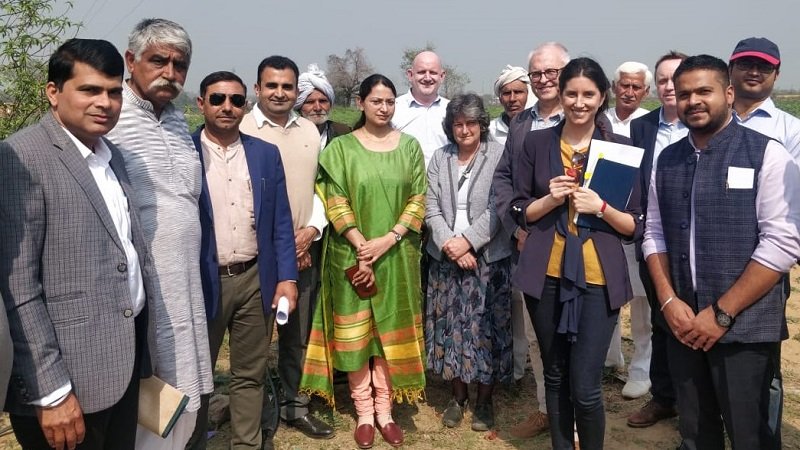British experts are in Delhi, Haryana and Hyderabad working out the most effective way of helping farmers to increase economic wellbeing by making the most of improved crop post-harvest management and clean, sustainable chilled distribution systems.
Half of India’s employment depends on agriculture. Prime Minister Modi has stated his vision for doubling farmers' income to set forth a strategic direction for future development. Agri-logistics is a vital component in the Government of India’s farm income strategy.
Indian State Governments plan to set up a series of Integrated Pack Houses aggregating and linking clusters of smallholder farmers to markets by refrigerated transport links that use energy efficient and sustainable technologies – reducing food loss and decreasing the amount of wasted produce.
The Government of India is keen to develop projects, including joint collaborative research, that can demonstrate innovative, sustainable technologies for pack House Management and cold-chain solutions. Haryana State Government, for example, is planning to create more than 350 Pack houses in the state whilst the Government of India is targeting 22,000 new agri-processing and logistics hubs.
In partnership with the British High Commission in India and the Agri-Tech sector team at the Department for International Trade, British experts are developing a plan for a UK India collaboration for the first of a kind ‘Centre of Excellence’ in Haryana to support roll-out of sustainable post-harvest management and cooling at scale in India.
Led by experts from the newly formed Centre for Sustainable Cooling at the University of Birmingham, the UK team also includes academics from Cranfield University, London South Bank University, University of Greenwich and NIAB East Malling Research as well as industry experts including Martin Lishman.
Information gathered in India this week will form the basis of an industry workshop on 2 April 2020 hosted by the University of Birmingham at its UK campus to consider opportunities for industry engagement in this fast-growing market opportunity.
Toby Peters, Professor of Cold Economy at the University of Birmingham, commented: “Food loss is a major challenge with up to 40% of some produce grown lost between farm and market. Focusing on how food can be saved in the supply chain is as important as food produced.
“We are bringing together UK and Indian partners to create template projects showcasing sustainable technology and expertise that could help farmers in India maximise their income by reducing waste, maintaining product quality and connecting to more distant markets. The challenge is to achieve this sustainably using renewable energy solutions.”
The recently-established Centre for Sustainable Cooling (CSC) will work closely with governments, international development agencies, NGOs and industry to deliver access to sustainable cooling for all.
Professor Peters commented further: “Access to cooling is not a luxury. It is about fresh food, safe medicines and protection from heat for populations in a warming world. It is vital for economic productivity as it allows workers, farmers and students to function effectively in comfortable environments.
“If we are to deliver access to cooling for all who need it, we will potentially see four times as many appliances deployed using five times as much energy as today. How we meet this challenge and provide cooling for all will have important ramifications not only for our climate, but also for our broader aspirations for a sustainable future.”
28 February 2020
British experts join Indian farmers to reduce food loss sustainably
Related news
LU-VE Group’s Spirotech plant receives National Export Award in India
LU-VE Group’s Indian subsidiary, Spirotech, has received the National Export Award from the Engineering Export Promotion Council (EEPC), under the Ministry of Commerce, Government of India. The awa...
yesterday
Midea and AHRI expand global HVAC collaboration with China HQ meeting
On June 12, Stephen Yurek, President of the Air Conditioning, Heating, and Refrigeration Institute (AHRI), led an AHRI delegation to Midea Air Conditioning Headquarters to deepen global collabo...
25 Jun 2025
MHI-AC&R wins JARAC award for CO2-based cooling unit retrofit
Mitsubishi Heavy Industries Air-Conditioning and Refrigeration Corporation (MHI-AC&R) has received a Recommendation Award in the Refurbishment Equipment category of the 42nd Excellent Energy Sa...
yesterday
MHI Thermal Systems Begins Field Test of Surplus Energy Storage System
Mitsubishi Heavy Industries Thermal Systems, Ltd. (MHI Thermal Systems) has launched a field test of its jointly developed “Surplus Renewable Energy Absorption and Release System,” using Aquifer Th...
today
Daikin expands VZ series with high-temperature option using R-1234ze
Daikin has introduced a new high-temperature configuration for its EWWH-VZ water-cooled inverter chiller and heat pump series, enabling hot water supply up to 90 °C. This update extends the operati...
yesterday
Daikin and Hitachi Launch AI Trial for Equipment Failure Diagnostics
AI agent combines OT expertise and generative AI to support factory maintenance.
Daikin Industries, Ltd. and Hitachi, Ltd. have begun trial operations of an AI agent designed to supp
24 Apr 2025
